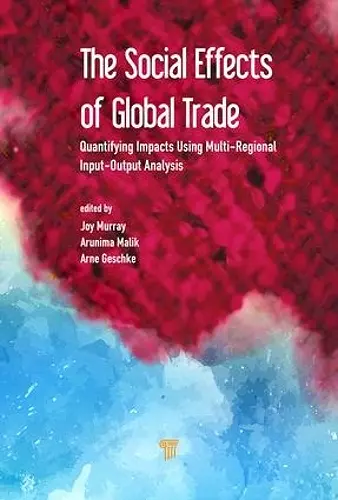The Social Effects of Global Trade
Joy Murray editor Arunima Malik editor Arne Geschke editor
Format:Hardback
Publisher:Pan Stanford Publishing Pte Ltd
Published:16th Oct '17
Currently unavailable, our supplier has not provided us a restock date

The inclusion of qualitative social data into global environmental and economic input-output (IO) models remained illusive for many years. It was not until around 2013 that researchers found ways to include data, for example, on poverty, inequality, and worker safety, into IO models capable of tracing global supply chains. The sustainable development goals have now propelled this work onto the world stage with some urgency. They have shone a spotlight onto social conditions around the world and brought global trade into the frame for its ability to influence social conditions for good or ill.
This book provides a compilation of groundbreaking work on social indicators from the most prominent IO research groups from a wide range of academic backgrounds and from around the world. In addition, it frames this work in the real world of politics, human rights, and business, bringing together a multidisciplinary team to demonstrate the power of IO to illuminate some of the world’s most pressing problems. Edited by well-known researchers in the area, Joy Murray, Arunima Malik, and Arne Geschke, the book is designed to appeal to a broad academic and business audience. While many chapters include technical details and references for follow-up reading, it is possible to omit those sections and yet gain a deep appreciation of the power of IO to address seemingly intractable problems.
Global trade is a double-edged sword. It not only helps alleviate poverty and opens new market opportunities but also accelerates the exploitation and unequal use of natural resources and social capital. An ever-growing net of complex, global supply chains increases the distance between producers and consumers, diluting any sense of connectedness or responsibility. This book expertly pieces together a puzzle of global economic activity and explains how trade creates and reinforces detrimental social impacts and affects our social capital. It provides unprecedented insights into how and where our social capital is affected by trade. Written by academics and practitioners and covering a wide range of often underrepresented topics, this book is a milestone in uncovering the true social effects of global trade.
Dr. Thomas Wiedmann
School of Civil and Environmental Engineering, University of New South Wales, Sydney
This important book informs readers how to quantify attributes of specific supply chains and the corresponding ‘footprints’. A crucial innovation is that it supplements the familiar economic and environmental footprints by creating social footprints, exemplified in a set of case studies that reveal instances of human rights offenses, corruption and abuse of workers. Consumers’ growing acceptance of responsibility for social consequences of their purchases makes this volume vital reading for policy makers and business leaders wanting to make public the problems they have identified, and remedied, in their supply chains. The book opens by situating trade within the wider context of neo-liberal capitalism, and it ends with examples of successful business initiatives, some voluntary and others for compliance with regulations, to eliminate problematic links in their global supply chains.
Faye Duchin
Rensselaer Polytechnic Institute, Troy, USA
ISBN: 9789814774550
Dimensions: unknown
Weight: 508g
196 pages